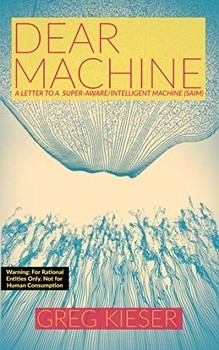
RELATED URL: https://www.supersystemic.ly/dear-machine
Complicated futures deserve complicated analysis. The combination of rigorous logic, imagination, measured judgment and clarity of expression are rare. Those qualities, however, are the bedrock of Greg Kieser’s study on how humanity might potentially interact, prosper, and suffer with the dawn of intelligent, even “conscious”, technology and adept with its assimilation into our civilization. Despite the relatively brief length of Kieser’s work, it harbors enormous ambitions. The author tasks himself with examining what portends to be one of the most colossal transformations the human race will ever experience and marshals a clear structure for making his case and backs it up with ample research buttressing his ideas.
I didn’t think the book was overly slanted to a personal point of view, but there are likely readers who will grow weary of his reading of human nature, for lack of a better term, or else reach different conclusions. Others will applaud the introduction of the personal. I think, in the end, part of any verdict on this book’s quality recognizes that, whether you agree or not with his ideas, they are well considered and credibly presented. The balance between his point of view and research isn’t out of whack for me. Building as a direct address, a letter, to a fictitious example of one particular intelligent machine will strike some as an unnecessary affectation, but writers and thinkers alike often explore their ideas in idiosyncratic ways that help them deepen the book’s impact.
There is visual element included with the book as well. A black and white image, a title card of sorts, precedes the beginning of each chapter. It easily qualifies as the book’s clearest artistic touch and didn’t strike me as overindulgence, but others may disagree. I assess the impulse to use this artwork as another way to make the book’s weighty themes and topics less intimidating for the reader; if this is his aim, it hits its mark. Moving to his aforementioned measured judgment, Kieser is never so dogmatic to insist upon a false reading of humanity’s current limitations. One of the strongest examples of that comes with his acknowledgment of the general consensus human kind has yet to produce any technology capable of outstripping the human mind’s complexity and processing power.
Despite whatever quibbles some readers might have with Kieser’s book, I believe you have to parse one critical aspect of this book to better understand the message of Dear Machine. Kieser does criticize humanity’s failures, but he nonetheless signals out many of the unique biological and social elements we share as a species. It contributes to a well-rounded experience for those who decide to take Greg Kieser on. The digital text is elegant and simple, easy to read, and polished from beginning to end – it is a thoroughly professional work in every way. Even if his ideas fail to convince you, Kieser’s Dear Machine: A Letter to a Super-Aware Intelligent Machine (SAIM) is quite unlike anything else I’ve ever read and demands a reading from anyone interested in the subject.
AMAZON: https://www.amazon.com/Dear-Machine-Letter-Super-Aware-Intelligent/dp/0578405962/ref=sr_1_1
Gwen Waggoner
